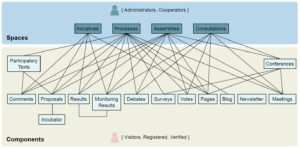Decidim, for the Catalan term let’s decide, is a platform for participatory democracy which enables the creation of citizen participation portals. The platform provides a set of components which configure different participatory spaces in the portals. For instance, Decidim incorporates components to enable the proposal of initiatives, calling for assemblies, defining processes or calling for consultations.
Portals created with Decidim allow any organization (local city council, association, university, NGO, neighborhood or cooperative) to create mass processes for strategic planning, participatory budgeting, collaborative regulatory design, urban spaces, and elections. It also enables the organization of in-person meetings, meeting invites, registrations, the publication of minutes, the structuring of government bodies or assemblies, the convening of consultations, referendums or channeling citizen or member initiatives to impact different decision-making processes.
The Platform
The Decidim platform is modular, scalable, easy to configure and integrated with other tools. The platform is organized in terms of participatory spaces and components, which we briefly describe in the following.
- Participatory spaces. A space defines a participatory channel or media through which citizens or members of an organization can process requests or coordinate proposals and make decisions. In Decidim we find four types of spaces, namely: initiatives (e.g., a citizen initiative), processes (e.g., a participatory budget), assemblies (e.g., a workshop to discuss a proposal) and consultations (e.g., a call for voting for/against a proposal).
- Participatory components. A component defines a mechanism that enables a specific interaction between users and spaces. In Decidim we currently find sixteen types of components, namely: meetings, conferences, conferences, incubators, proposals, participatory texts, surveys, discussions and debates, results, monitoring, votes, pages, blogs, observations, newsletters and search engines.
Participatory spaces and components are used by Decidim users, which can be classified according to three groups:
- Visitors, who have access to all the content of the portal.
- Registered members, who can contribute by adding comments, creating proposals, sending messages and following elements of the portal.
- Verified members, who may be recognized as member of an organization, citizen or a decision-making community. Verified members enjoy the highest level of participation in the portal and, apart from the actions included in the previous group, they can also register for in-person meetings, support proposals, sign initiatives and vote for consultations.
The following figure illustrates the main participatory spaces and components in Decidim, together with the set of users. The Figure also includes the main dependencies between components, which we do not elaborate here, more information can be found in the work by Barandiaran et al.

Decidim Social Contract
Decidim defines a social contract for democratic guarantees and open collaboration for the community around the project. Any user or developer of the Decidim platform must fully accept and commit to this social contract. The social contract covers six main topics:
- Free Software and Open Content. The code of the platform (including modules, libraries or any other code that is developed for its functioning and deployment) will always be Free Open Source Software. Furthermore, the content, data, APIs and/or any other interfaces that are deployed to interact with any type of user must follow an open and interoperable standard. Likewise, the content, text, graphics, fonts, audio, video or other design elements will be published under a Creative Commons By-SA.
- Transparency, traceability and integrity. Decidim must ensure the transparency, traceability and integrity of documents, proposals, debates, decisions, or any other object, mechanism or participatory process. This means that all data related to all such participatory mechanisms and processes are available for download, analysis and treatment, following the most demanding standards and formats to share information.
- Equal opportunities and quality indicators. The platform promises to ensure equal opportunities for all people, as well as for their proposals or other contributions the platform might host. The platform will offer equal starting opportunities to all participatory objects (proposals, debates, etc.) for them to be viewed, discussed, commented, evaluated or treated without discrimination of any kind. In this sense, the platform ensures that the digital identity of the users will always be personal and not transferable.
- Data confidentiality. The confidentiality and privacy of the personal data that people might provide to participate in any of the functionalities and/or possibilities of participation that the platform provides shall be guaranteed at all times.
- Accountability and responsibility. A commitment to citizens shall be taken to respond to all queries and contributions in the shortest time possible. A commitment shall also be adopted to follow-up the results of participatory processes and to respond to those demands specifically request it.
- Continuous improvement and inter-institutional collaboration. Mechanisms for periodic review and evaluation will be provided in order to facilitate the continuous improvement of the platform.
Decidim and Metadecidim
Portals deployed by Decidim enable for participatory democracy in city councils, associations or universities, among others. Additionally, this participatory nature is also applied to the very own Decidim platform. Thus, the development of the Decidim project is driven by a participatory portal devoted to allowing anyone to contribute and discuss new features (or improvements) for the platform. This participatory portal which oversees Decidim is called Metadecidim.
This has the huge benefit of empowering all kinds of users to participate in the future of Decidim. Nevertheless, it also introduces a duality in the governance of the project between those participating in the project via Metadecidim versus those participating directly on the GitHub side of the project. Precise rules on the governance of both layers (and on the interaction between the two) may be required to keep a consistent view of the project across all project levels. A well-defined governance process is key to manage a growing community of users and contributors, especially when the project aims to follow democratic principles in its governance strategy (a rarity).

Associate Professor at Universitat Oberta de Catalunya and researcher at SOM Research Team, in Barcelona, Spain, he likes investigating on how software is developed, in particular how open-source software is developed and how people collaboratively drives the creation process. He has been working mainly in the area of programming & domain-specific languages, modeling, modernization and model-driven engineering.

